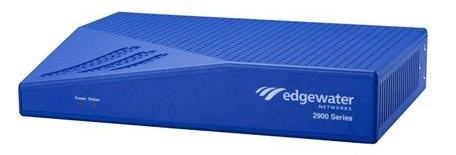Review of the EdgeMarc 2900a and 2900e Enterprise Session Border Controllers

Update: Since this article was published, in 2018, Edgewater Networks was acquired by Ribbon Communications.
Edgewater Networks has added to its line of enterprise session border controllers (eSBCs) with its EdgeMarc 2900A and 2900E models. These are designed to enable enterprises and service providers to future-proof their SIP trunking and Unified Communications (UC) deployments. With built-in mechanisms for both QoS and security, they provide intelligent mechanisms allowing for both hosted PBX services as well as SIP trunking applications.
They have several features that differ from other EdgeMarc SBCs.
Designed for fast-growing businesses
The EdgeMarc 2900 series SBCs provide a scalable configuration based on session licenses and field upgrades as the needs of the enterprise grow. Able to support up to 300 concurrent voice calls and up to 2,000 registered devices, they are ideal for any small- to medium-size enterprise that expects to experience rapid expansion. Furthermore, they offer two optical WAN interfaces to connect with fiber optic local loops provided by the telco.
In addition to all of the features provided by the 2900E, the 2900A includes analog FXO and FXS ports for use with fax machines, paging systems, and external independent PSTN lines.
Key Features
The key features of these devices include:
Interfaces
- Up to 1 Gbps data rates on the WAN interface
- Two copper (RJ-45) and two optical (SFP) WAN ports
- Six FXS and two FXO ports (2900a only)
SIP and voice Features
- Support for SIP transparent and multi-homed proxy modes
- Signaling and media protocols include UDP, TCP, TLS, RTP and SRTP
- Support of major ITU-T VoIP codecs including G.711, G.722, G.726 and G.729 and T.38 for fax
Network Features
- Support for NAT/PAT
- 1Q VLANs supported
- IPv4 and IPv6 supported
- Routing protocol support includes BGP, RIP and OSPF
Security
- Stateful VoIP aware firewall
- DoS Protection
- Encryption and authentication supported include: TLS, SRTP, HTTPS, SSH, 3DES and AES
- IPsec VPN and Proxy ARP supported
QoS
- Full MOS support including Jitter and packet loss
- Diffserv (DSCP)
- IP Precedence
- Policing
Compatibility with other services
Both devices are compatible with Edgewater’s Cloud2Edge Complete service, EdgeView Service Control Center and EdgeMarc Intelligent Edge, all of which reduce operational expenses and ease maintenance and administration tasks by integrating the control of the devices with the cloud.
An additional convenient feature of the EdgeMarc 2900 series SBCs is the fact that they can be deployed as a VMs for KVM, VMware and Hyper-V virtual machines. In such an implementation, no additional hardware is actually required for deployment. This is especially handy if the enterprise network already has available an established and robust VM infrastructure.
Why use an SBC?
Data communications infrastructures based on the TCP/IP model were originally developed several decades ago. As such, they were designed to specifically handle traditional data communications needs. With the advent of network convergence, where voice and data now share one infrastructure, it has been necessary to modify the functionality of TCP/IP-based networks to accommodate the specific needs of packetized voice services.
Because of this, one area that often causes problems when attempting to transmit VoIP packets is the network edge – that is, the border between the enterprise network and the ISP. Because of features such as Network Address Translation (NAT), Virtual Private Networks (VPNs), firewall implementations, as well as the employment of quality of service (QoS) mechanisms that exist at the network edge, VoIP can often be difficult to transmit over such borders. This can often result in one-way or no-way voice, a degradation of sound quality, a potential security breach, or VoIP calls failing completely.
The solution to these and other issues of transmitting VoIP packets over the network edge is the employment of a Session Border Controller (SBC). This device has become an important part of the VoIP service arsenal. For more information, refer to our article on the Five reasons you should add an SBC to your IP network.
CONCLUSION
It is necessary to employ specialized devices to accommodate VoIP services on an IP network, especially at critical locations such as the network edge. The EdgeMarc 2900 series eSBCs make this easy while providing high availability, resiliency, and flexibility to accommodate the needs of fast-growing businesses.
Browse the full line of Edgewater Networks products available through TeleDynamics' website.
You may also like:
Implementing VoIP safely and efficiently on the network edge
For a safe new year, you need more than a firewall
Cloud and UC: Is your telephone system on board?









Comments